Promoting Care for Child Development in Community Health Services - A Summary of the Pakistan Early Child Development Scale-up (PEDS) Trial Main findings, delivery strengths and the path forward
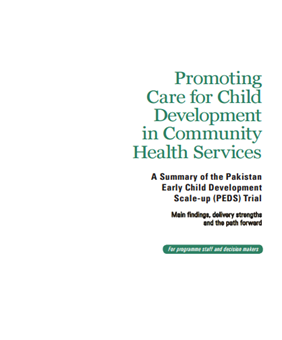

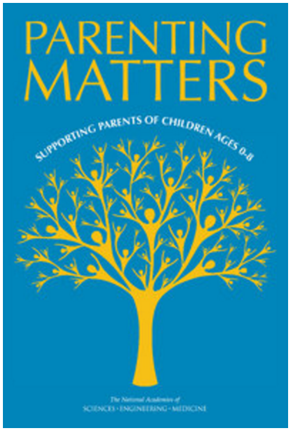
Decades of research have demonstrated that the parent-child dyad and the environment of the family—which includes all primary caregivers—are at the foundation of children's well- being and healthy development. From birth, children are learning and rely on parents and the other caregivers in their lives to protect and care for them. The impact of parents may never be greater than during the earliest years of life, when a child's brain is rapidly developing and when nearly all of her or his experiences are created and shaped by parents and the family environment.
Parenting Matters identifies parenting knowledge, attitudes, and practices associated with positive developmental outcomes in children ages 0-8; universal/preventive and targeted strategies used in a variety of settings that have been effective with parents of young children and that support the identified knowledge, attitudes, and practices; and barriers to and facilitators for parents' use of practices that lead to healthy child outcomes as well as their participation in effective programs and services. This report makes recommendations directed at an array of stakeholders, for promoting the wide-scale adoption of effective programs and services for parents and on areas that warrant further research to inform policy and practice. It is meant to serve as a roadmap for the future of parenting policy, research, and practice in the United States.
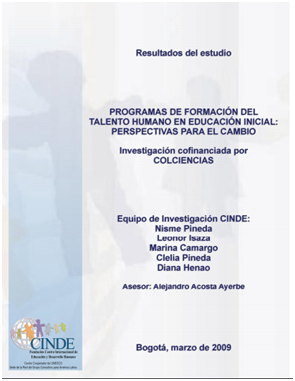
This document is an integral part of the set of technical references of the Strategy “De Cero A Siempre”, which seeks to guide those who have responsibilities in the Comprehensive Early Childhood Care (AIPI) about the promotion of child development through the lenses of protecting children’s rights. In this sense, these Guidelines are in line with other Guidelines published under the strategy and aims at informing the qualification of all those who work in the field of early childhood. The document is understood as a qualification of the workforce in the field of education that aims, on the one hand, to broaden, deepen and renew the knowledge previously acquired by people who work -directly or indirectly- with early childhood and on the other hand, to improve early childhood care practices in such a way that they aim at the holistic development of children aged 0 to 6 years. The Guidelines are accompanied by the operative guide and the monitoring and evaluation proposal.
Authors: Year of Publication:2013
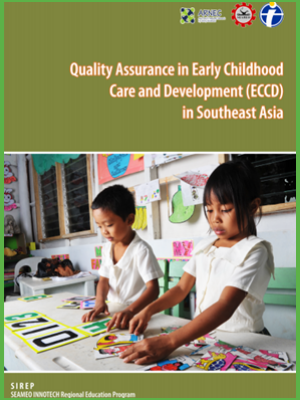
SEAMEO INNOTECH has prioritized Early Childhood Care and Development (ECCD) in Southeast Asia as one of its programmatic areas to support universalization of ECCD in the region. As part of its research agenda, the Center has completed an investigation of the ECCD quality assurancepolicies, mechanisms and models being implemented by SEAMEO member countries. Out of the 11 SEAMEO member countries, ten participated in the study. Data collected from these countries were analyzed to generate a regional ECCD quality assurance profile. SEAMEO INNOTECH is now pleased to share these findings in this latest publication.
The current publication discusses the current and depth of these ECCD policies, mechanisms and models as well as issues and challenges that still need to be addressed by SEAMEO member countries.
One major finding of the study shows that although there are ECCD policies and standards already in place in most SEAMEO member states, there is an absence of explicit ECCD quality assurance frameworks that could serve as an anchor for a holistic ECCD program. Because of this absence, most ECCD policies and standards in Southeast Asia are limited to qualifications of pre-school heads and teachers, early learning curricula, and requirements of physical facilities.
It is hoped that this publication will support SEAMEO member countries in their efforts to act on strengthening their ECCD policies and standards and formulating a comprehensive and holistic ECCD quality assurance framework that would consider the varied needs of pre-school children.
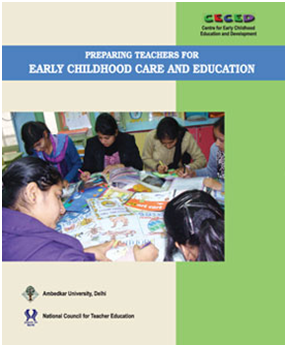
Preparing Teachers for Early Childhood Care and Education brings forward several issues on teacher preparation which are not only significant in current contexts, but also for the future. The study provides data on the following emerging issues:
The report provides a wide range of recommendations in order to address the above issues. Recommendations evolve around the following topics: 1) duration of the course; 2) ensuring equitable access with quality; 3) strengthening regulation of standards; 4) improve practice teaching; 5) involving teacher educators; 6) upgrading the curriculum; and 7) maximizing the potential of open and distance education.
Authors: Year of Publication:2011
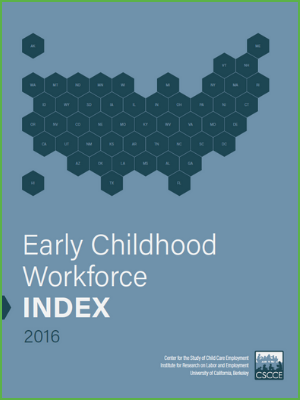
The Early Childhood Workforce Index represents the first effort to establish a baseline description of early childhood employment conditions and policies in every state and to track progress on a state-by-state basis to improve early childhood jobs. Providing states with periodic appraisals of their efforts, based on measurable status and policy indicators, is aimed at encouraging states to step up their efforts to address these persistent workforce challenges and at supporting related advocacy efforts. It is our hope that expanded and consistent focus on early childhood jobs will, in turn, generate refined strategies and encourage the incubation and testing of sustainable policies to attend to compensation and other issues that have gone largely unaddressed.
Authors: Year of Publication:2016
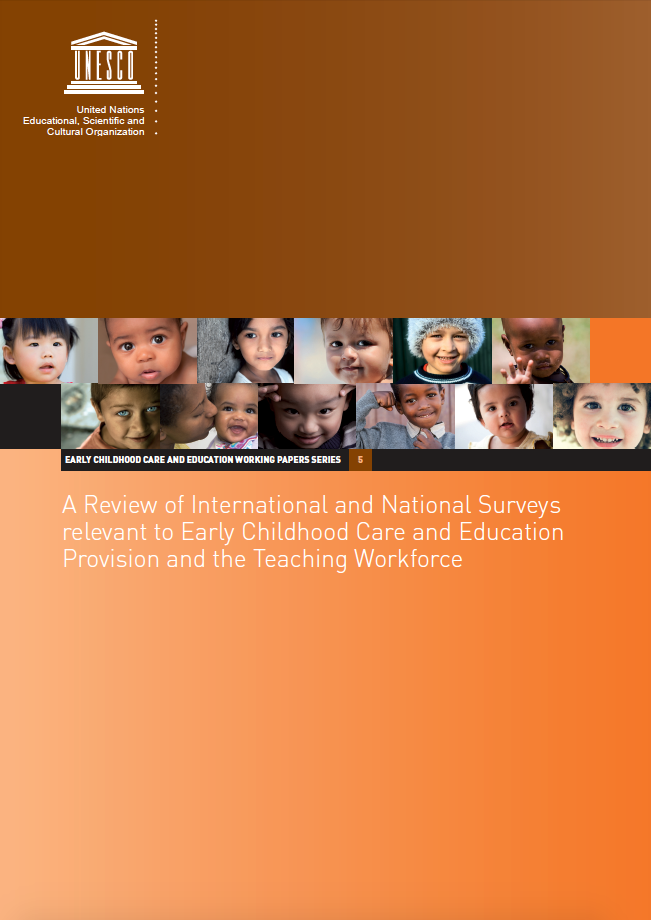
This literature review of national and international surveys of early childhood care and education (ECCE) provision and the teaching workforce was commissioned by UNESCO to inform the development of survey instrument and methodology for the Survey of Teachers in Pre-Primary Education (STEPP) project (May 2015–December 2017). The key tasks set by UNESCO were to:
The main purpose of the surveys was to make visible information about the teacher workforce in order to analyse and compare policy, to highlight issues that might be supported by policy and practice and to make plans within countries to enhance the teacher workforce. Survey information can also generate theoretical understanding by enabling relationships between variables to be examined.
The report presents lessons learnt from the implementation of the surveys as well as recommendations for future research.
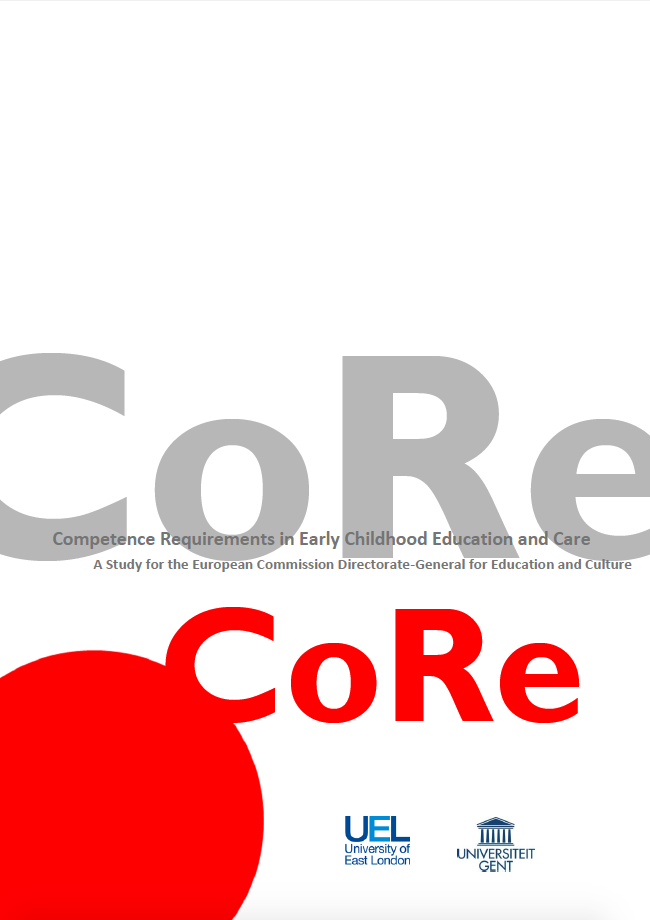
There is a broad consensus among researchers, practitioners, and policymakers that the quality of early childhood services – and ultimately the outcomes for children and families – depends on well-educated, experienced and ‘competent’ staff. But what exactly makes a competent early childhood practitioner? How can competence be understood, and its development supported, in the highly complex and demanding field of working professionally with young children, families and communities? What approaches do different countries take, and what lessons can be learnt from practices developed by practitioners, training institutions and policymakers across Europe? This report presents the findings of a European research project jointly conducted by the University of East London (UEL) and the University of Ghent (UGent). The ‘study on competence requirements in early childhood education and care’ (CoRe) explored conceptualisations of ‘competence’ and professionalism in early childhood practice, and identified systemic conditions for developing, supporting and maintaining competence in all layers of the early childhood system. In the light of the research findings, and intensive consultation with key stakeholders in ECEC in Europe, CoRe has developed policy recommendations, which are also part of this report.
The aim of CoRe is to provide policy-relevant information, advice and case studies with regard to the competences required for the ECEC workforce and how to support competence development from a systemic perspective. In order to achieve its aims, CoRe has conducted original research, reviewed previous work and international literature, and consulted with experts in the field over a period of 15 months. In this report, we present the findings of the different but interrelated strands of this process which underpin the policy recommendations regarding systemic competence development and professionalisation in early childhood education and care in Europe. By providing informed views on the questions at stake we hope to initiate discussion, to provoke new thinking, and to encourage new questions.
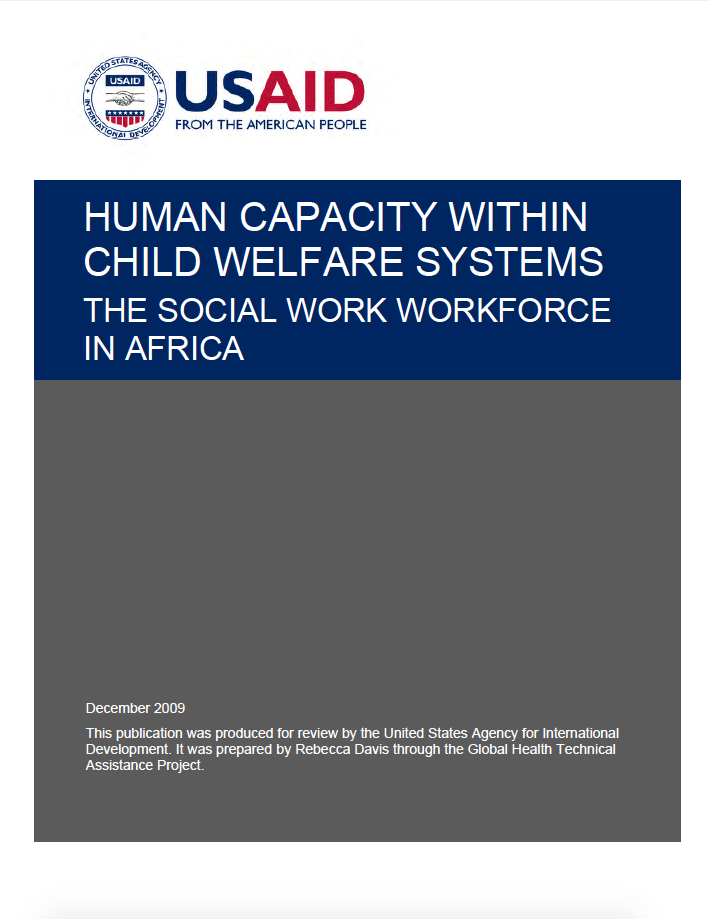
The aim of this study is to inform stakeholders about the opportunities for and constraints on building the social work workforce within the child welfare sector in Africa. Based on principles and practices of family-centered, community-based social work practice for orphans and vulnerable children (OVC), this report analyzes the capacity of the child welfare workforce and the education and training of social workers in Africa within the framework of African child welfare policies. Opportunities and constraints of the child welfare workforce in Africa are identified based on the a four-pillar framework that includes: 1) Policy and Legal Framework; 2) Child Welfare Service Models and the Practice Environment; 3) Education and Training; and 4) Outcomes and Performance Measures. One observation that underscores all the other observations and findings is that there exists a historically rich social work profession in Africa that was built on a community ideology and focused on meeting the needs of vulnerable children and families, especially those living in poverty. The loss of community in social work methods, the lack of indigenous knowledge and the underdevelopment of the profession, and the need to build the capacity of child welfare and social work education systems in Africa are consistent themes in this analysis. Results highlight that strengthening child welfare systems necessitates an approach that connects laws, policies, the child welfare practice environment, workforce capacity (including education and training), and defined outcome measures and data collection systems.
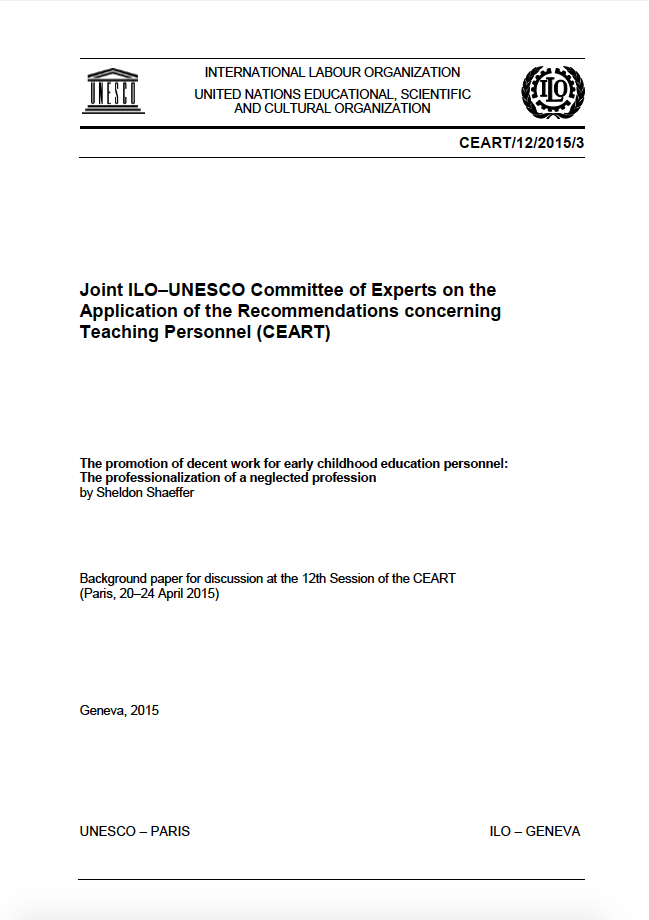
This background paper highlights the importance of early childhood development and presents ECE data on demand, enrolments and national policies. It also discusses the important role of pre-primary/early childhood education and the complexities of the teaching profession. Special emphasis is given into the professionalization of the field and examples in the following fields: 1) the roles and responsibilities of government bodies, employer organizations, trade unions and civil society groups; 2) ECE content: Curricula and teaching methods; 3) ECE financing; 4) Preparation for the profession; 5) Recruitment, deployment and retention; 6) Professional and career development; 7) Employment terms and conditions; 8) Learning and teaching conditions; 9) Evaluating ECE personnel; and 10) ECE governance and social dialogue.
Drawing on the analysis of those factors, a variety of recommendations in line with the 1966 ILO/UNESCO Recommendation concerning the Status of Teachers, as well as the ILO guidelines, have been suggested, which should be put in place by governments and other providers of early childhood education to enhance the professionalization of – and improve the working conditions of – ECE personnel.